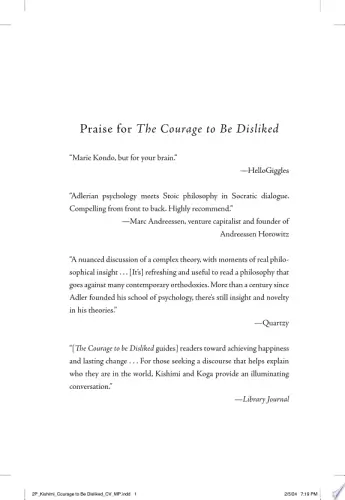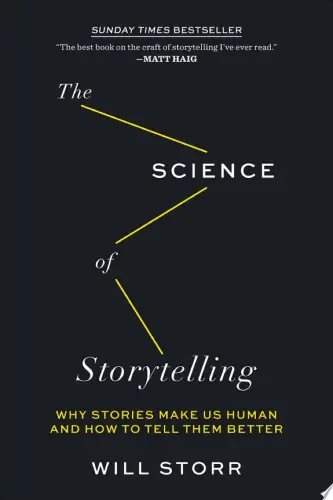The 48 Laws of Power
What's it about?
The 48 Laws of Power is a guide that delves into the timeless principles of power dynamics and manipulation. Robert Greene's masterpiece offers a comprehensive look into the strategies used by history's most influential figures to achieve and maintain power. Each law is backed by historical examples, making it a valuable resource for those looking to navigate the complex world of power dynamics. Whether you're a leader, entrepreneur, or simply looking to better understand human behavior, this book is a must-read for anyone seeking to master the art of power.
About the Author
Robert Greene is a bestselling author known for his books on power dynamics, manipulation, and strategy. His most famous works include "The 48 Laws of Power" and "The Art of Seduction." Greene's writing style is blunt and provocative, offering a deep dive into the darker aspects of human behavior. He explores themes of deception, manipulation, and social dynamics, providing readers with insights on how to navigate the complexities of power in various aspects of life.
10 Key Ideas of The 48 Laws of Power
Make Others Come to You — Use Bait if Necessary
Instead of exhausting yourself by chasing after people or opportunities, position yourself so that they seek you out.
This tactic is about controlling the interaction and the power dynamics from the outset.
By making others approach you, you dictate the terms of the engagement, gain valuable information by observing how they present themselves, and often, can leverage their desire or need for what you have.
Using bait involves presenting something that draws people in — whether it’s the promise of help, insights, or resources — making them invest effort and making it harder for them to walk away.
Learn DeeperIdentify what you can offer that others want or need: Start by understanding your strengths, skills, or resources that are valuable to others. This could be expertise in a certain area, access to a network, or even your ability to listen and provide advice.
Create visibility around your value: Use social media, blogs, or networking events to share insights, stories, or examples of your work. The goal is to make your value known to potential seekers without directly reaching out to them.
Design an enticing bait: Think about what would make your offer irresistible to your target audience. This could be a free initial consultation, an exclusive piece of content, or a trial service. Make sure it's something that showcases your value and is relevant to their needs.
Set the stage for engagement: Once you've attracted interest, ensure you have a clear process for people to engage with you. This could be scheduling a meeting, signing up for a newsletter, or following you on social media. Make it easy for them to take the next step.
Observe and adapt: Pay attention to who is responding to your bait and how they are engaging. Use this information to refine your approach, tailor your offerings, and improve your strategy over time.
- Example
A freelance graphic designer shares a series of before-and-after project images on Instagram, highlighting their unique style and problem-solving skills. They include a call-to-action offering a free initial design consultation for new clients.
- Example
A business consultant hosts a free webinar on overcoming common startup challenges, using it as bait to attract early-stage entrepreneurs. During the webinar, they offer attendees a discounted rate for their first consulting session.
Never Outshine the Master
Always make those above you feel superior.
In your desire to prove your worth, it’s easy to overstep and make your superiors feel threatened by your talents or successes.
To maintain a favorable position within any hierarchy, ensure your achievements do not overshadow those of your leaders.
This strategy protects you from their insecurities and potential backlash.
It’s about strategic humility; showcase your talents without eclipsing the authority or achievements of those you report to, thereby securing your position and advancing without resistance.
Learn DeeperObserve and Adapt: Pay close attention to your superior's interests, values, and the way they present their achievements. Adapt your own presentation of work to align with these observations, ensuring you complement rather than compete.
Seek Feedback Actively: Regularly ask for feedback on your work from those above you. This not only shows humility and a willingness to learn but also gives you insights into how to calibrate your achievements without overshadowing your superiors.
Credit Sharing: When you achieve something noteworthy, make it a point to share credit with your team and, importantly, highlight the support and guidance of your superiors. This demonstrates team spirit and deflects any perception of trying to outshine others.
Master the Art of Subtlety: Learn to showcase your talents and achievements in a way that is subtle and nuanced. Instead of directly stating your accomplishments, weave them into stories or conversations that also acknowledge the role of others, especially your superiors.
- Example
If you've led a project that succeeded beyond expectations, during a meeting, instead of focusing solely on your leadership, you might say, 'This project succeeded not just because of my efforts, but because of the incredible support and guidance I received from [Superior's Name], and the hard work of my team.'
- Example
When contributing an idea that solves a problem, you could frame it as, 'Building on what [Superior's Name] mentioned earlier, I explored a few adjustments and, with their insight, was able to develop this solution.' This approach acknowledges the foundational role of your superior while still showcasing your initiative and problem-solving skills.
Conceal Your Intentions
Keep your plans and strategies mysterious.
When you reveal your intentions, you become predictable and open to counterattacks.
By concealing your goals, you keep people off-balance and in the dark, thus controlling the game.
This ambiguity creates a cloud of mystery around your actions, compelling others to watch you closely and react to your movements.
While you, aware of your final aim, can adjust your strategies as needed without interference from outside forces.
Learn DeeperKeep your goals to yourself: When working on a new project or goal, resist the urge to share your plans with everyone. This doesn't mean you can't discuss your work or passions, but be strategic about what details you reveal and to whom.
Use misdirection when necessary: If you're pressed for details about your plans, learn the art of misdirection. Share information that is true but unrelated to your actual intentions. This satisfies curiosity without compromising your strategy.
Practice strategic ambiguity: When discussing future plans, especially in competitive environments, be deliberately vague about the specifics. This creates a sense of mystery and prevents others from easily predicting your next move.
Monitor your digital footprint: In today's digital age, information spreads quickly. Be mindful of what you post on social media regarding your plans, projects, or achievements. Even a harmless post can reveal more than intended.
- Example
Imagine you're launching a new business. Instead of announcing your launch date and services upfront, you tease the market with hints of something big coming. This builds anticipation and keeps competitors guessing about your exact offerings.
- Example
You're planning a career change and are in the process of interviewing with other companies. Instead of openly discussing your job search with colleagues, you keep your efforts private until you have secured a new position. This prevents any potential sabotage or unwanted advice.
Always Say Less than Necessary
When you speak, say less than you know.
By holding back information and not revealing your full thoughts or plans, you become an enigma, and others cannot predict or manipulate you.
This tactic leverages the power of silence; the less you say, the more weight your words will carry.
Speaking excessively can lead to revealing more than intended and can diminish your authority.
Strategic silence fosters an air of mystery and increases your perceived wisdom and control.
Learn DeeperPause Before Responding: In conversations, especially important ones, take a moment to pause before you reply. This gives you time to consider your words carefully and to speak with intention rather than impulsively.
Limit Sharing Personal Plans: When discussing future projects or goals, keep the details to yourself unless sharing is necessary. This creates a sense of mystery and prevents others from potentially undermining your plans.
Practice Active Listening: Focus more on listening than speaking. By doing so, you gather more information, which can be advantageous, and when you do speak, your words are more likely to be considered and impactful.
Use Open-Ended Questions: Encourage others to talk more about themselves or the topic at hand by asking questions that require more than a yes or no answer. This not only makes you appear more engaging but also keeps you in control of the conversation flow without revealing much about yourself.
- Example
In a job interview, when asked about your future career plans, instead of detailing every ambition, you might say, 'I'm really focused on roles where I can grow and contribute significantly, particularly in areas like this one.' This answer shows ambition and alignment with the company's goals without boxing you into specific expectations.
- Example
During a negotiation, rather than immediately countering an offer, you might say, 'That's an interesting proposal. Let me think it over and get back to you.' This not only buys you time to consider your options but also keeps the other party guessing about your position and limits.
So Much Depends on Reputation — Guard it with Your Life
Your reputation is the cornerstone of your power.
It precedes you in every situation and can either open doors or close them.
A strong, positive reputation increases your presence and intimidates enemies, making it easier to navigate social and professional landscapes.
Protecting and enhancing your reputation involves being mindful of your actions and their public perceptions.
Promptly addressing any attacks or slanders is crucial, as is continuously demonstrating qualities that reinforce the desired perception of your character.
Learn DeeperBe Consistent in Your Actions and Words: Ensure that your behavior and speech align with the reputation you wish to build. Consistency breeds trust and reinforces your desired image.
Actively Manage Your Online Presence: Regularly update your social media profiles and be mindful of what you post. Engaging positively online can enhance your reputation, while negative interactions can harm it.
Address Negative Feedback Promptly and Diplomatically: If you encounter criticism or slander, respond calmly and constructively. Ignoring it can sometimes be perceived as an admission of guilt, while aggressive confrontation can damage your reputation further.
Showcase Your Achievements Without Bragging: Share your successes in a way that highlights your skills and contributions without coming off as arrogant. This can involve crediting your team or emphasizing the collaborative nature of your accomplishments.
- Example
A professional who receives a negative review online decides to respond by thanking the reviewer for their feedback, explaining the steps taken to address the issue, and inviting them to discuss the matter further offline. This demonstrates accountability and a commitment to improvement.
- Example
An individual looking to build a reputation as a thought leader in their industry starts a blog where they share insights, trends, and advice. They ensure the content is valuable, consistent, and reflects their expertise, thereby enhancing their professional image.
Deeper knowledge. Personal growth. Unlocked.
Unlock this book's key ideas and 15M+ more. Learn with quick, impactful summaries.
Read Full SummarySign up and read for free!
The 48 Laws of Power Summary: Common Questions
Experience Personalized Book Summaries, Today!
Discover a new way to gain knowledge, and save time.
Sign up for our 7-day trial now.
No Credit Card Needed

Similar Books

Comprehensive Casebook of Cognitive Therapy
Frank M. Dattilio
The Piano Teacher
Elfriede Jelinek
The Courage To Be Disliked
Ichiro Kishimi
We Were Liars
E. Lockhart
The Art of Solution Focused Therapy
Elliott Connie, MA, LPC
The Science of Storytelling
Will Storr
No Longer Human
太宰治
Wanting
Luke Burgis
Mrs Dalloway
Virginia Woolf
The Rational Optimist
Matt RidleyTrending Summaries

Peak
Anders Ericsson
Never Split the Difference
Chris Voss
Smart Brevity
Jim VandeHei
The Psychology of Money
Morgan Housel
The First 90 Days
Michael D. Watkins
Atomic Habits
James Clear
Thinking, Fast and Slow
Daniel Kahneman
The Body Keeps the Score
Bessel van der Kolk M.D.
The Power of Regret
Daniel H. Pink
The Compound Effect
Darren HardyNew Books

Comprehensive Casebook of Cognitive Therapy
Frank M. Dattilio
The White Night of St. Petersburg
Michel (Prince of Greece)
Demystifying Climate Models
Andrew Gettelman
The Hobbit
J.R.R. Tolkien
The Decision Book
Mikael Krogerus
The Decision Book: 50 Models for Strategic Thinking
Mikael Krogerus
Fichte
Johann Gottlieb Fichte
Do No Harm
Henry Marsh
This is Going to Hurt
Adam Kay

